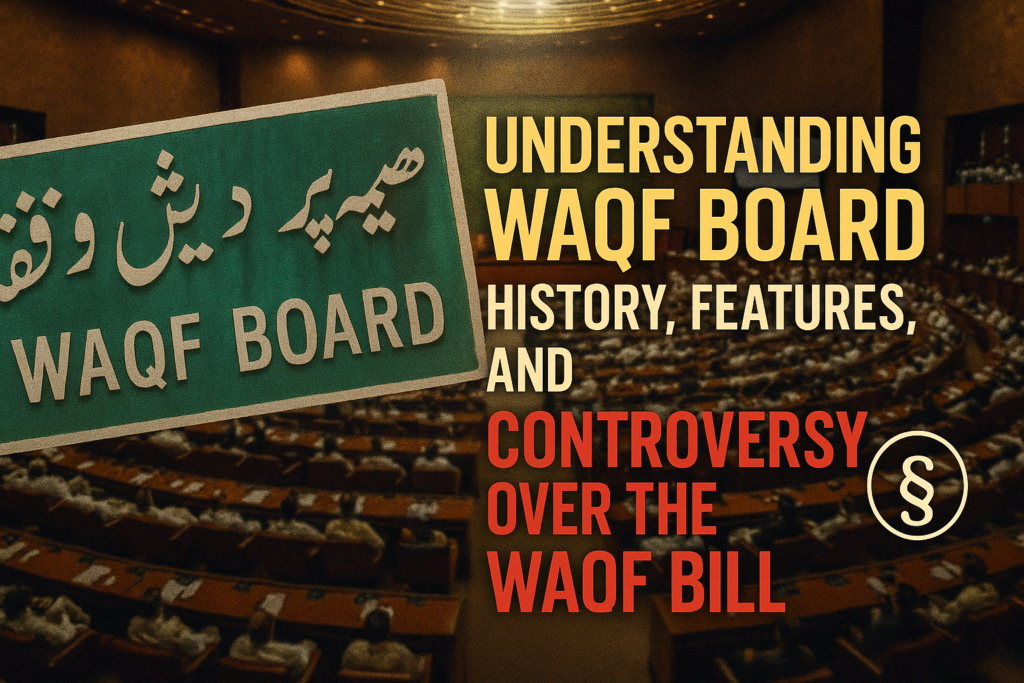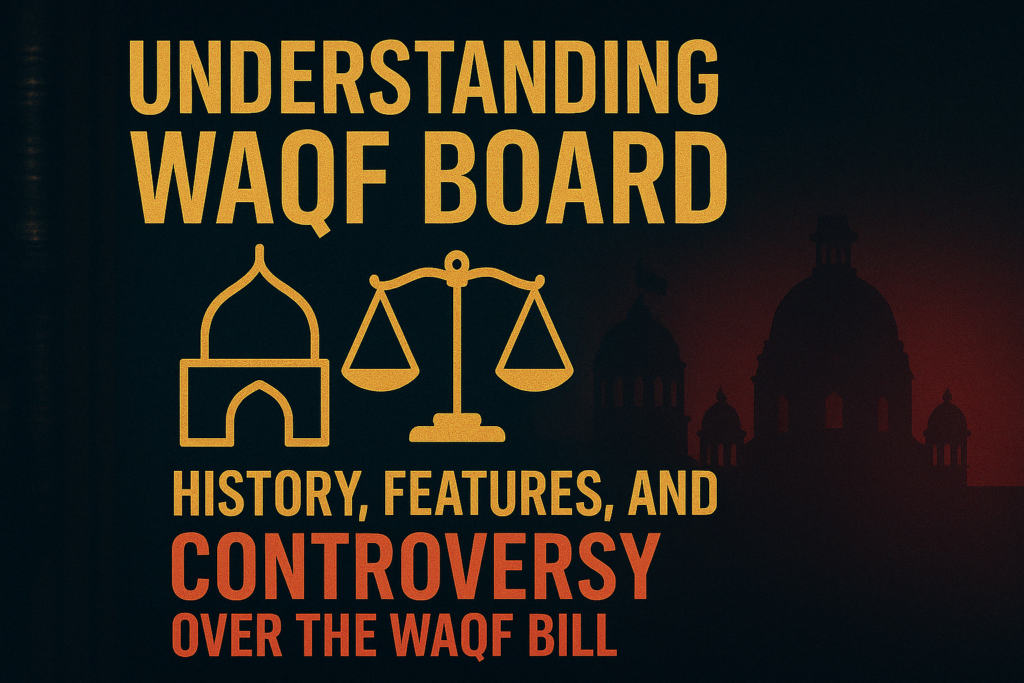
The Waqf Board has always been crucial for the Islamic community in India. It manages properties donated for religious or charitable purposes. In this blog, we will explore the Waqf Board, the communities under its purview, its features, and the reasons behind the Muslim community’s dissatisfaction with the Waqf Bill. We’ll also discuss why some view the bill as a positive step. Additionally, we will cover the Waqf Board’s history, its current status, and its future in India.
The Waqf Board plays a vital role in supporting the Muslim community in India. It has a long history of managing charitable properties. However, the debate over the Waqf Bill highlights the challenges of balancing governance with the community’s needs. Whether the Waqf Bill will bring progress or create issues remains uncertain. But one thing is clear: the future of the Waqf system will evolve, impacting millions of lives across India. For more details on the Waqf Board and its impact, check out official resources.
What is Waqf Board?
The Waqf Board in India is a statutory body that manages properties donated by Muslims for religious, educational, and welfare purposes. The term “Waqf” refers to the act of permanently dedicating one’s property to charity without expecting profit.
The Waqf Board ensures these properties—such as land, buildings, and community centers—are used according to Islamic principles and for the betterment of society.
Waqf Amendment Bill 2024
— PIB India (@PIB_India) September 13, 2024
On August 8, 2024, two bills, the Waqf (Amendment) Bill, 2024, and the Mussalman Wakf (Repeal) Bill, 2024, were introduced in the Lok Sabha with an aim to streamline the Waqf Board's work and ensure the efficient management of Waqf properties.
The… pic.twitter.com/UUmKDPyOeO
Key Features of Waqf Board:
- Property Management: Manages and monitors thousands of Waqf properties across India used for mosques, madrasas, schools, and hospitals.
- Charitable Purposes: Properties are meant exclusively for religious, educational, and welfare services within the community.
- Legal Oversight: Ensures lawful use of properties and addresses disputes regarding illegal occupation or misuse.
- Income Generation: Leases Waqf lands for revenue, which is reinvested in community welfare programs.
- Community Development: Funds are used to improve access to education, healthcare, and economic opportunities.
Which Communities Come Under Waqf Board?
The Waqf Board was originally established to manage and oversee charitable donations within the Muslim community. As a result, Muslims are the primary beneficiaries of the Waqf system. The resources from Waqf properties support the economic, educational, and social development of Muslims in India.
However, the reach of the Waqf Board is not limited to Muslims alone. In some instances, marginalized or disadvantaged communities also benefit from Waqf initiatives and properties. While the focus remains on Muslims, these resources help uplift a broader segment of society.
Muslim Community and Waqf Properties:
Mosques and Madrasas: A significant portion of Waqf properties are designated for the upkeep of mosques and madrasas (Islamic schools).
Community Centers: Waqf properties often include community halls and other venues used for social and religious gatherings.
Healthcare and Welfare: Many Waqf properties are used to support hospitals, healthcare centers, and homes for the elderly, furthering welfare for disadvantaged groups.
History and Creation of Waqf Board
The Waqf system has deep roots in Islamic tradition, dating back to the time of the Prophet Muhammad. It is believed that the Prophet set the example by donating land for charitable purposes, establishing the foundation of the Waqf system.
The Indian Waqf Act of 1954
In India, the Waqf Act of 1954 was the first significant legal step taken by the government to regulate the management of Waqf properties. This act aimed to ensure that Waqf assets were used effectively for the benefit of the community and to protect the rights of the beneficiaries.
The Role of the Central Waqf Council (CWC)
To manage the Waqf system across the country, the Central Waqf Council (CWC) was established. This council oversees the functioning of state-level Waqf Boards. Each state government has its own Waqf Board, which is responsible for managing Waqf properties within its jurisdiction. All these boards operate under the Central Waqf Council to maintain uniformity and effectiveness in managing Waqf assets across India.

Why is the Muslim Community Not Happy With the Waqf Bill?
Recently, the Waqf Bill has become a point of contention. While it aims to streamline the management of Waqf properties and improve governance, many in the Muslim community have expressed dissatisfaction. Here are some reasons:
Centralization of Power: One of the main concerns is the centralization of control over Waqf properties. Critics argue that the bill gives more control to the central government, which may reduce the authority and autonomy of the state Waqf boards.
Lack of Representation: Some argue that the bill doesn’t adequately represent the Muslim community, as it places significant powers in the hands of non-Muslim administrators in certain cases, leading to fears of mismanagement.
Conflict Over Property Ownership: The bill includes provisions that could potentially undermine the security and ownership rights of individuals and organizations that manage Waqf properties, leading to disputes.
Inefficiency in Utilization: Some members of the Muslim community believe that the current structure does not effectively utilize Waqf resources, especially in terms of welfare and education. They worry that these issues might be exacerbated by the new Bill.
Why Do Some People Consider the Waqf Bill a Good Move?
Despite the opposition, there are also supporters who view the Waqf Bill as a positive development. Here’s why:
Improved Governance: The bill aims to bring better transparency and accountability to the management of Waqf properties. By introducing modern technologies and better legal frameworks, the bill could ensure proper usage of Waqf assets.
Better Utilization of Resources: Proponents believe the bill will help in the better management and utilization of Waqf properties, ensuring they are used for the intended welfare purposes.
National Standardization: A single, standardized framework for managing Waqf properties could reduce inconsistencies across the country, ensuring that all properties are handled uniformly and according to legal guidelines.
Enhanced Welfare Impact: The bill is expected to promote greater investment in community development, healthcare, and education, leading to a larger-scale impact on the Muslim community and other marginalized groups.
➡️ Reasons for Introducing the #WaqfAmendmentBill:
— BJP (@BJP4India) April 6, 2025
* Waqf properties not generating enough income
* Brings accountability and transparency
* Eliminates fake Waqf property claims
* Prevents disinheriting women
* Imposes penalties for corruption and misuse
For more, watch the… pic.twitter.com/bUn5cKbKTU
Current Status of the Waqf Board in India:
As of 2025, several state-level Waqf boards in India have been dissolved or suspended due to ongoing disputes surrounding the Waqf Bill. This has resulted in significant disruptions to the functioning of the Waqf system in the country.
Many community leaders and Muslim organizations are calling for immediate action to either reinstate these boards or introduce alternative measures to ensure the proper management of Waqf properties. Until the Waqf Bill is passed, these groups continue to lobby for their concerns to be addressed, aiming to ensure that the Waqf Board fulfills its intended purpose of supporting welfare and community development.
Waqf Board and the Future: What’s Next?
The Waqf Board has long been a key institution for supporting the Muslim community in India. However, changes are on the horizon, especially with the potential passing of the Waqf Bill. This new legislation may bring significant adjustments to how the Waqf system operates, with both advantages and challenges. The outcome will depend on how the government and the community address the concerns of all stakeholders to ensure the system continues to benefit those it was intended for.
Looking ahead, Waqf properties are likely to play an even more crucial role in community development and charitable initiatives. As the Muslim population grows, the importance of the Waqf Board in meeting the community’s needs will only continue to increase.
Conclusion
The Waqf Board plays a crucial role in the welfare of the Muslim community in India. It has a rich history of managing charitable properties, but the debate surrounding the Waqf Bill demonstrates the complexity of balancing governance with community needs. Whether the Waqf Bill will lead to progress or problems remains to be seen, but one thing is certain: the future of the Waqf system will continue to evolve, shaping the lives of millions in India.
Key Takeaways:
The Waqf Board manages properties donated by Muslims for charitable purposes.
The Waqf Bill has sparked debate, with some expressing concerns over centralization and lack of representation.
Supporters believe the bill will improve governance, welfare, and transparency.
The future of the Waqf system is intertwined with the growth and development of the Muslim community in India.
Related Keywords
Waqf Bill, Muslim community in India, Waqf properties, Indian Waqf system, Waqf Board issues, Minority affairs in India, Waqf Bill concerns, Waqf board reforms, India Waqf properties, Waqf board governance, Indian government minority policies, Waqf system future, Indian Waqf laws, Waqf Bill controversy, Waqf Board Muslim community.